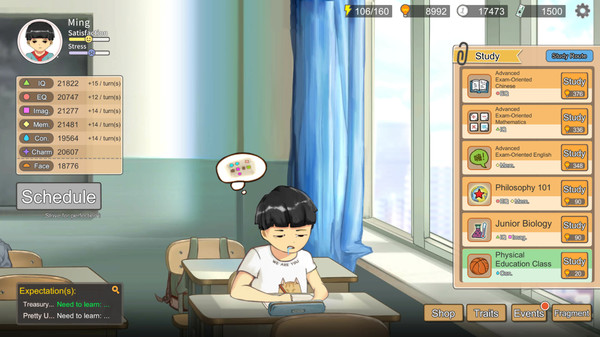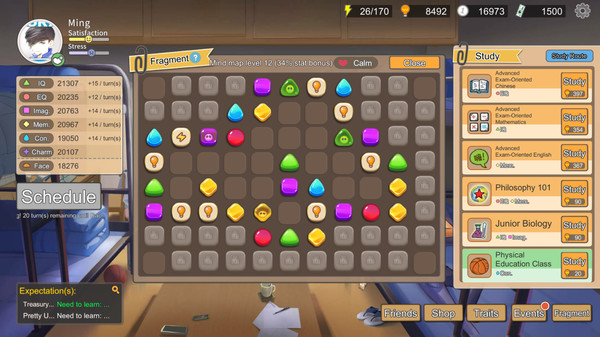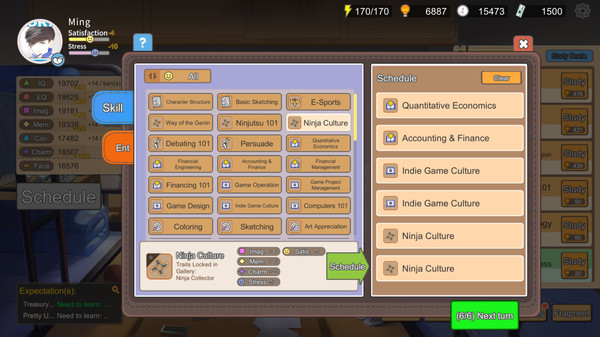Chinese Parents, developed by Beijing-based indie studio Moyuwan Games, is a life simulation game that offers a surprisingly nuanced, heartfelt, and often satirical portrayal of childhood and adolescence in a modern Chinese household. Originally released in 2018 and later translated for international audiences, the game has steadily built a devoted following for its blend of humor, cultural specificity, and simulation depth. At first glance, it may appear to be a quirky parenting simulator, but Chinese Parents is, in truth, a layered social commentary wrapped in the structure of a casual, accessible life sim. It’s a game as much about pressure and expectations as it is about personal growth and self-expression. In Chinese Parents, players take on the role of a child born into an ordinary Chinese family and guide them from birth through the gaokao (China’s all-important college entrance exam). Along the way, you'll manage everything from study schedules and extracurriculars to friendships, hobbies, and even romantic interests. The game’s mechanics are deceptively simple. Each turn represents a week, during which you’ll choose how the child spends their time—balancing mental development, physical health, social interactions, and rest. These decisions impact a variety of stats like intelligence, imagination, charisma, and stress, which in turn influence opportunities later in life. While the core loop revolves around resource management and stat-raising, what elevates Chinese Parents is how tightly its mechanics are interwoven with its themes. The game is deeply rooted in the cultural context of Chinese society, where academic achievement, family reputation, and filial piety often dictate the trajectory of a child’s life. Every milestone—be it the pressure of getting into a good middle school or the weight of parental expectations—is conveyed with a mix of emotional weight and subtle satire. Your in-game parents, especially, serve as a constant presence, pushing you toward success with the classic “tiger parent” intensity. While their comments may seem harsh or overbearing, the game also humanizes them by revealing their own struggles and regrets, creating a richer narrative tapestry than one might expect from a simulation game. One of the most distinctive aspects of Chinese Parents is the “Mind Map” mechanic. As your character learns new skills or interacts with peers, their cognitive development is visualized in a branching map that represents learned knowledge and personality traits. Unlocking nodes leads to new abilities or stat boosts, creating a satisfying feedback loop that captures the complexity of growing up. The system is both strategic and metaphorical, reflecting how a child’s mind develops from exposure to ideas, play, pressure, and praise. Social interactions in the game are equally important. You’ll navigate friendships, school rivalries, and potential romantic relationships, all while contending with self-doubt and teenage angst. The writing here is often witty and heartfelt, and although the English localization is occasionally rough around the edges, it manages to retain the emotional resonance and cultural nuances of the original. The romantic elements, while not the focus, add another layer of emotional stakes as players approach the gaokao and the end of adolescence. Graphically, Chinese Parents adopts a cartoonish, hand-drawn aesthetic that enhances its charm without sacrificing emotional impact. Character sprites are expressive, and while the visuals aren’t flashy, they serve the tone of the game well. The soundtrack is light and unobtrusive, often shifting subtly to match the emotional cadence of each life stage. Combined, the art and music create a comforting, almost nostalgic atmosphere that mirrors the bittersweet journey of growing up. Another interesting feature is the generational gameplay loop. After completing one child’s story—usually culminating in the gaokao—you unlock the next generation, who inherits certain traits and stat bonuses. This roguelite-style progression encourages multiple playthroughs and invites players to explore different paths, whether aiming for Ivy League acceptance or choosing to embrace a more relaxed, creative lifestyle. It adds long-term depth and subtly critiques the idea of generational pressure and inherited expectations. That said, Chinese Parents is not without flaws. The pacing can sometimes feel repetitive, particularly in the mid-to-late game as the weekly grind sets in. The UI, while functional, can be cluttered and overwhelming to newcomers. Additionally, while the game touches on important themes—like gender expectations, mental health, and personal freedom—it sometimes does so with a light touch that leaves certain ideas underexplored. Players expecting deep branching narratives or significant life-altering choices might find the outcomes a bit too formulaic. Still, these shortcomings don’t undermine the game’s strengths. Chinese Parents manages the rare feat of being both deeply personal and widely relatable. It captures the universal experience of growing up—navigating family, identity, and ambition—while offering a rare window into the specifics of Chinese cultural and educational pressures. For players of Chinese descent, it can be a cathartic, even emotional experience. For international players, it’s a culturally rich and often eye-opening journey through a different, but not unfamiliar, model of childhood. In conclusion, Chinese Parents is a smart, touching, and culturally insightful simulation that blends personal storytelling with meaningful mechanics. It walks a fine line between playful satire and sincere empathy, making it one of the more unique entries in the life sim genre. Whether you play it once or revisit it across generations, the game offers a compelling portrait of childhood shaped by both love and pressure, and it invites reflection on how we grow—and how we’re shaped by those who raise us. Rating: 9/10
Expand the review

























